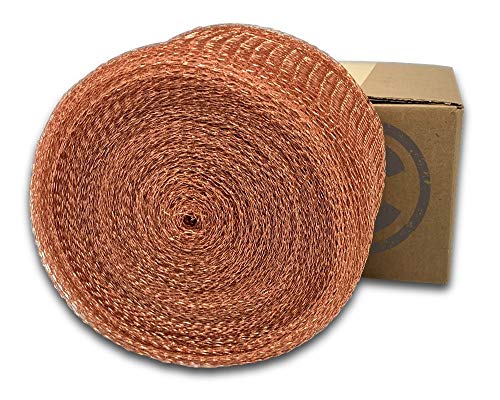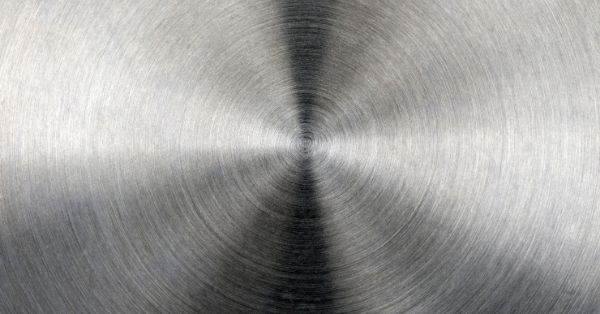As an affiliate, I may collect a share of sales or other compensation from the links on this page.

With 5G becoming a more popular option for cellphone signals, I regularly get people asking me if copper protects from 5G radiation. Well here’s a quick answer:
Copper, in the form of a fine mesh, can help to protect against 5G radiation. 5G is a form of EMF radiation, and copper is an excellent conductor of electrical and magnetic wavelengths. It’s great at attenuating these waves providing the mesh is fine enough.
In this article, I’ll look at some specific information on why copper is so good at protecting against radiation, and how you can use this information at home.
Also read: Does 5G Cause Dizziness?
Why is Copper Good at Protecting from 5G?
Copper is the most common metal used for electrical wiring because it’s an amazing conductor. While some metals, such as gold and silver, are better, they’re far too expensive for mass production.
Copper has greater resistance than the other metals, which is what leads to electrical attenuation. Attenuation is defined as the loss of signal strength when passing through a material.
Usually, you want as little resistance as possible in electrical transfer, but when it comes to protecting against 5G radiation, this is exactly what you want.
To effectively attenuate EMF radiation (of which 5G is part), you need to use mesh with holes smaller than the wavelength you’re trying to block.
This is why your microwave door has mesh on it; the mesh blocks microwaves from escaping when the machine is in use.
So the copper mesh has to have holes as small as the shortest wavelength you’re trying to protect against.
5G uses wavelengths between 30 and 300GHz, which is measured in millimeters. In fact, the wavelengths are typically between 1 and 10mm.
This means that for copper mesh to effectively protect against 5G radiation, it needs to have holes no bigger than 1mm.
You need to be aware, though, that copper doesn’t absorb 5G radiation. Copper mesh will simply block wavelengths from passing through it, meaning the mesh will need to be between you and the radiation source to offer any kind of protection.
In short, providing you can find copper mesh fine enough, it’ll definitely help to protect against 5G radiation.
Just remember that you need mesh with holes no bigger than 1mm if you want to protect against the full spectrum of 5G wavelengths.
How to Use Copper to Protect Yourself at Home
It’s unlikely that you’ll be able to find copper mesh fine enough to protect against 5G radiation.
One way you could try and overcome this is to buy standard copper mesh (Amazon link) and build it up in layers. A few layers should provide some protection against 5G wavelengths.

While you can get copper Faraday protection fabric (Amazon link) this isn’t rated to protect against 5G radiation.
It often works on frequencies up to 5GHz, which is enough to protect against things like Wi-Fi and microwave radiation. 5G uses much higher frequencies.
You can also buy pure copper fabric (Amazon link), but again this only protects up to wavelengths of 18GHz.
We can only hope that as 5G becomes the more common option for phone signals that copper’s protective abilities is applied to new methods designed for this high-frequency radiation.
Make Sure You Own an EMF Meter
Before you start thinking of ways to protect your home from 5G radiation, it’s worth investing in an EMF meter.
This is the definitive way to test whether any solutions you attempt will actually work. You can check out this video for more information on how to use an EMF meter.
Again, it’s worth finding an EMF meter that measures the frequencies you’re trying to protect against, which can be up to 300GHz. Many EMF meters go up to 35-40GHz, so you might need to shop around to find one that does the job.
Are there Other Metals that Block 5G Radiation?

Copper is easily one of the most effective and popular metals used for protecting against 5G radiation. But there are other options, including:
- Nickel
- Zinc
- Aluminum (related article)
- Steel
- Iron
- Nickel silver
- Brass
In short, most metals that have some degree of electric conduction can offer suitable protection against 5G radiation. The biggest issue is that because the technology is still new, few companies have developed protective equipment yet.
This means that, for the time being, there are few protection options specifically for 5G radiation. So to protect against 5G radiation, for now, your best options are to follow tried and tested protection methods.
These include:
1. Distance
One of the main concerns about 5G is the number of signals masts needed to provide effective coverage. Because the wavelengths are so short, they don’t travel very far.
But this works to your advantage because you need significantly less distance between you and a source of 5G radiation. In fact, a solid brick wall is often enough distance between you and the source.
2. Spend time away from sources
Again, a popular method for protecting against 5G radiation is to simply limit your exposure. The less time you spend around sources, the less of an issue it’ll be.
For now, this is fairly easy because the technology is still being rolled out across the country. Providing you don’t live in the center of a major city, you should have very little issue.
Of course, this’ll change over time. But as long as you spend as little time as possible around sources of 5G radiation, you’ll be able to protect yourself.
To make these options more effective, carry your EMF meter around with you so you can test areas where you’ll spend a lot of time.
Some Final Thoughts
Hopefully, I’ve given you some useful information on how copper can help to protect against 5G. But until more devices exist that utilize this technology for the specific wavelengths, it’s not going to be of much benefit around the home.
In the meantime, I recommend you do as much as possible to protect yourself from major sources of 5G radiation.